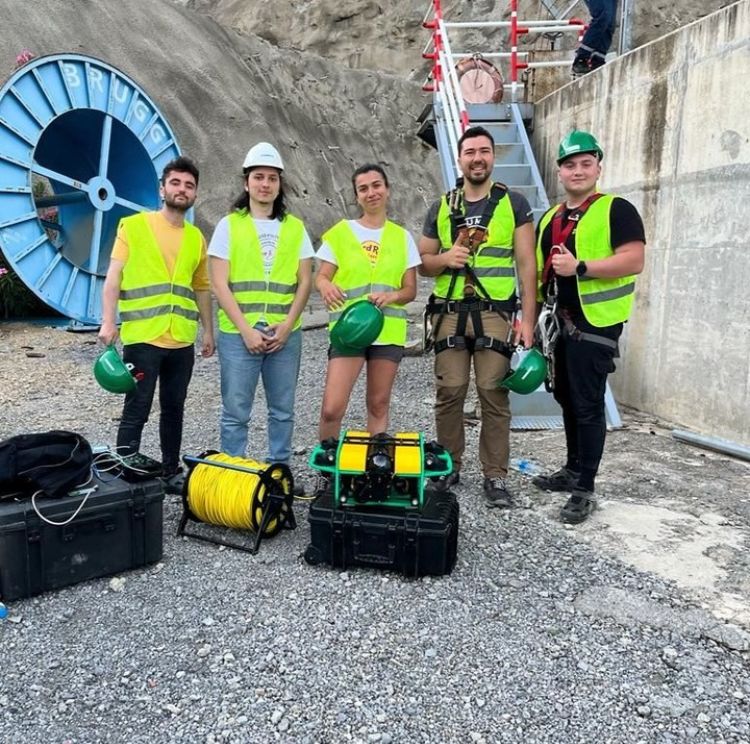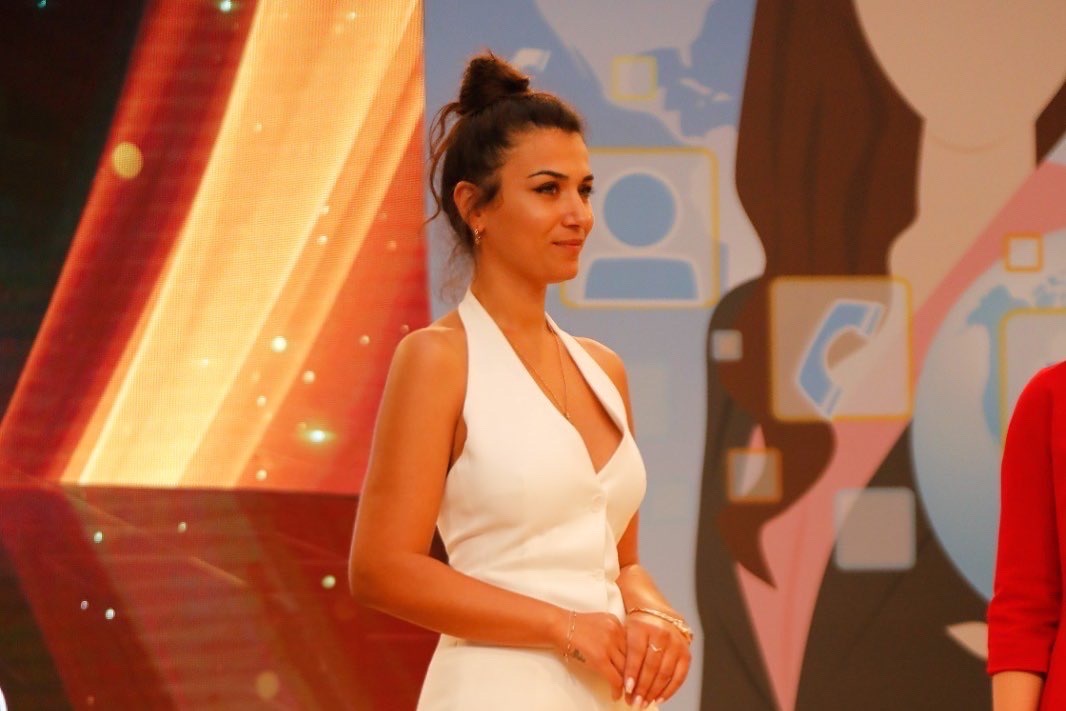A very niche startup and here’s Werover’s story with the words from the founder, Balca Yılmaz
Werover is a operating in a very nich area: it used to work with ship and submarine companies to solve their problems under the sea. Then, it pivoted and used a robot that could perform damage assessment for hydroelectric power plants with power generating companies. “Werover’s most recently developed acoustic listening technology focuses on early damage detection for wind turbine blades. Data from the deployed acoustic systems are processed through machine learning algorithms developed by the Werover team to detect damage at a very early stage when it is not visible yet,” said Z. Balca Yılmaz, CEO and Co-Founder at Werover. I spoke to Yılmaz and here’s what she told me.
What is Werover? What are you doing exactly? Can you tell me the brief story Werover?
Werover is a company founded by my partner and me in 2018 with government support. When we first started out, we were working with ship and submarine companies to solve problems under the sea. Later, we transformed the technology we used into a robot that could perform damage assessment for hydroelectric power plants in collaboration with Enerjisa Üretim.
At this point, our story began to change, and Werover was born as an idea. As we entered the energy market, this world excited us even more and expanded our perspective. We realized that many of the things we learned underwater could actually solve problems in the wind energy sector. It was at this moment that the story of Werover’s Acoustic Solutions began.
The wind energy sector was both a trendy and influential market with great potential, and we wanted to provide solutions to its problems using artificial intelligence and machine learning. To summarize in general:
Through artificial intelligence and IoT technologies, Werover offers ultimate environmental sustainability and cost-saving solutions to the renewable energy sector. Currently, Werover’s products serve the renewable energy industry, particularly in the hydropower and wind energy segments.
Werover’s most recently developed acoustic listening technology focuses on early damage detection for wind turbine blades. Data from the deployed acoustic systems are processed through machine learning algorithms developed by the Werover team to detect damage at a very early stage when it is not visible yet. In this way, the aim is to prevent significant opportunity and energy losses by intervening at the right time to address damages detected at an early stage.

As a climatetech startup, I know you’re also in touch with power generation companies, namely Enerjisa Üretim. Can you elaborate the cooperation?
In 2020, Enerjisa Üretim reached us for a specific underwater robot for energy tunnel inspections in hydro power plants. We realized the opportunity and the potantial in this area and started to develop robotic system and software. We sold 2 robots to them and it took 2 years finishing products. We have received a lot of information and know-how from their technical teams and power plant areas. We have made annual operation service agreement with them for yearly inspections of energy tunnels. They helped us a lot and thanks to Enerjisa Üretim we could have a chance to know energy sector.
Werover’s business model
What’s the business model of Werover?
Werover’s team undertakes the responsibility of supporting renewable power generation by offering energy efficiency-enhancing solutions in this field. Through our extensive expertise in product manufacturing and AI, we focus on creating innovation that enables optimized asset management and risk planning to reduce costs around the development and upkeep of wind farms. Companies subscribe our software system and pay monthly for per türbine. We are also focused on minimizing EHS risks present in the process of turbine inspections. Our product benefits Insurance companies, service providers, wind farm owners, and even public authorities in various different ways. Werover has been in close contact with many potential customers and is collaborating with important stakeholders in the industry.
Did you get any investments so far? If not, is there any investment in sight?
We have successfully carried our operations to this day without any external investment. Our journey began with some government support, and then continued to grow financially through the operational sales of our underwater robot.
We are now developing a cutting-edge system for early damage detection in wind turbines. Although we have self-funded the development of this product for the past year, we have come to realize that we need investors to join us on this journey, not only for their financial backing but also for their expertise. We began our search for investors in early December last year and aim to finalize the process by May. We are currently in a $ 1 M seed investment round, having already term sheets.
Once the investment round is complete, we will commence sales with our dedicated team. I have great confidence in my team in this regard, as we have worked day and night to develop effective strategies and have meticulously planned every process down to the finest detail.
(Update: Werover raised $350.000 from 212 and Alchemy on May 18).
First Germany, now Werover plans to enter the UK market
I know you have an office also in Germany. What are you doing in Germany? Do you have plans to expand to other countries?
Indeed, Germany has been a market we considered entering from the moment we ventured into the renewable energy sector. As you may know, Germany boasts the largest economy in Europe and serves as a haven for investments and research in renewable energy sources, particularly in the field of wind energy, which we aim to develop further. When we initially established our office in Germany, we faced several concerns, including questions about our ability to succeed, cultural and linguistic differences, and whether it was too early for us to penetrate this market. However, as an entrepreneur, I could not allow my reservations to hinder me from tapping into a market with such immense potential. To be candid, we are delighted that we entered the German market, as the network we have built since day one has consistently provided new insights and greatly improved Werover.
We now have our sights set on expanding into the UK market, just across the coast. The UK ranks among the top three largest and fastest-growing markets for offshore investments and wind energy. Furthermore, compared to Europe, the UK has a more extensive business network and abundant investor opportunities. We foresee the UK market becoming one of our most prominent markets in the future.
As a female founder, did you have any challenges in starting and running your business? If yes, how did you handle them? And what would you recommend to other female founders to cope with those difficulties?
Actually being entrepreneur is always hard and challenging. I have never considered myself as woman or man, i have just fought for surviving every time. From investor side, sometimes there are some difficulties or sometimes there is positive discrimination. There are difficulties in commercial are. We are working B2B. Energy corporates are generally men-driven sector. It is not a big challenge but sometimes i can feel the discrimination of course. I have always handled it. It is also important that influencing other female entrepreneurs, providing them courage. Because, so many successful female founders influenced me very much, showing self-confidence is really important and most of young women need it.

How do you see the future of climatetech, both in Turkey and on a global scale?
Climate change has become increasingly apparent across the globe, particularly in the wake of the Covid pandemic, and has fundamentally altered numerous aspects of the world. Among the most critical realizations is that we all inhabit the same planet, and the issues facing one of us may ultimately impact us all.
At present, climate technologies constitute a continually growing field worldwide, consistently maintaining their relevance. Given that these technologies address global concerns, they occupy a more secure position amid crises and challenges.
This situation is also evident in Turkey, where numerous companies operating within the climate technology sector can rapidly develop their businesses and make significant impacts by leveraging various positive factors such as the country’s political stance, huge wind and solar resources, and a young workforce. The rising entrepreneurship sector in Turkey, which is just beginning to establish regulatory frameworks and support systems, consistently strives to create a global impact with the climate technology solutions it develops.
(By the way, I have a story about a Turkish circular economy startup, to see it click here )









